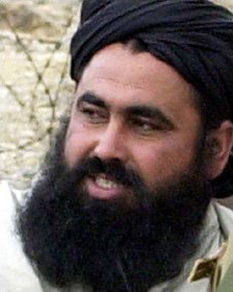
Baitullah Mehsud
Baitullah Mehsud (Pashto/Urdu: بیت اللہ محسود; c. 1970 – 5 August 2009)[1][2][3] was one of the founders and a leading member of the TTP in Waziristan, Pakistan, and the leader of the Tehrik-e-Taliban Pakistan (TTP). He formed the TTP from an alliance of about five militant groups in December 2007.[4][5][6] He is thought by U.S. military analysts to have commanded up to 5,000 fighters[4] and to have been behind numerous attacks in Pakistan[5] including the assassination of Benazir Bhutto which he and others have denied.
Baitullah Mehsud
Position created
c. 1970
Bannu District, Khyber Pakhtunkhwa, Pakistan
5 August 2009 (aged 38–39)
South Waziristan, Khyber Paktunkhwa, Pakistan
2000s–2009
Disagreement exists over the exact date of the militant's death. Pakistani security officials initially announced that Baitullah Mehsud and his wife were killed on 5 August 2009 in a U.S. Central Intelligence Agency drone attack in the Zangar area of South Waziristan. Interior Minister Rehman Malik delayed giving official confirmation and asked for patience and an announcement by Inter Services Public Relations (ISPR) or other agencies. Kafayat Ullah, a TTP source, also announced the death of the militant in the strike,[7] as did his deputy Faqir Mohammed.[8] Later Tehrik-i-Taliban Pakistan commander Hakimullah Mehsud denied previous TTP announcements and said Mehsud was in good health.[9] Major General Athar Abbas, ISPR spokesman, and Robert Gibbs of the White House said his death could not be confirmed,[10][11] U.S. National Security Adviser James L. Jones also claimed that there was "pretty conclusive" evidence that proved Baitullah Mehsud had been killed and that he was 90% sure of it.[12] On 23 August 2009, Hakimullah Mehsud and Wali-ur-Rehman telephoned the BBC to say that Baitullah Mehsud had died on 23 August 2009 due to injuries sustained during the 5 August attack.[1] On 30 September 2009, the BBC received a video that showed the body of Mehsud.[13]
Syed Saleem Shahzad, writing in the Asia Times, described Baitullah Mehsud as a physically small man, with diabetes.[14]
Background[edit]
Early life[edit]
Baitullah Mehsud was born in 1970 in the Landi Dhok village in the Bannu District of Khyber Pakhtunkhwa province of Pakistan, which lies some distance from the Mehsud tribe's base in the South Waziristan Agency, his native village there being Dwatoi in the Ladha Subdivision, his father having moved to Bannu for work. An ethnic Pashtun, he hailed from the Broomi Khel side of the Shabi Khel sub-clan of the Mehsud tribe, and was one of five brothers.[15][16]
He avoided media attention and refused to be photographed in adherence with his religious beliefs. Even if it's generally said that he did not attend schooling or religious madrassa,[6] other sources say he did get early education in Bannu and also got further education in Punjab, while during his student days he was affiliated with the Jamiat Tulaba-e-Islam (JTI), the student wing of Maulana Fazlur Rahman’s religious party Jamiat Ulema-e-Islam (F) (JUI-F), and in 1996 went to Afghanistan in order to fight the Northern Alliance with the Taliban and with Jalaluddin Haqqani as mentor.[17]
He emerged as a major tribal leader soon after the 2004 death of Nek Mohammad.[16] In a ceremony attended by five leading Taliban commanders, including Mullah Dadullah, Baitullah was appointed Mullah Omar's governor of the Mehsud area.[18]
Leadership dispute[edit]
After Nek Muhammad's death, Abdullah Mehsud and Baitullah Mehsud both vied for dominance of the Pakistani Taliban. When Abdullah died in a raid by Pakistani security forces and later his successor perished in a bomb explosion, Qari Zain and other members of Abdullah's faction suspected that Baitullah played a role in the attacks. The rivalry continued after Zainuddin obtained leadership of Abdullah's group.[19]